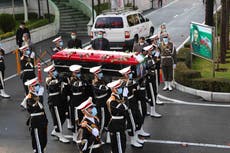Your support helps us to tell the story
From reproductive rights to climate change to Big Tech, The Independent is on the ground when the story is developing. Whether it's investigating the financials of Elon Musk's pro-Trump PAC or producing our latest documentary, 'The A Word', which shines a light on the American women fighting for reproductive rights, we know how important it is to parse out the facts from the messaging.
At such a critical moment in US history, we need reporters on the ground. Your donation allows us to keep sending journalists to speak to both sides of the story.
The Independent is trusted by Americans across the entire political spectrum. And unlike many other quality news outlets, we choose not to lock Americans out of our reporting and analysis with paywalls. We believe quality journalism should be available to everyone, paid for by those who can afford it.
Your support makes all the difference.Iran has reportedly started building work at its contentious underground nuclear facility, adding to tensions over the country’s atomic programme.
Satellite imagery acquired by the AP news agency shows work began at the Fordo site, close to the holy Shiite city of Qom and about 55 miles southwest of Tehran, in September.
It is not yet clear what Iran is building at the site, but recent images from 11 December appear to show a foundation dug into the ground with dozens of pillars.
Fordo is one of Iran’s two uranium enrichment facilities and was controversially exposed in 2009 during a previous bout of global tensions over the country’s nuclear ambitions.
Under the 2015 nuclear deal, Iran agreed to stop using Fordo to enrich uranium and convert the site to become a nuclear physics and technology research centre.
However, in 2018 Donald Trump unilaterally withdrew the United States from the pact and reimposed stringent economic sanctions on Iran.
Since then, the Islamic Republic has gradually broken limits set on uranium enrichment in the deal and pledged to restart nuclear activity, including at Fordo. It is, however, far below the levels of enrichment needed to produce a weapon.
"Any changes at this site will be carefully watched as a sign of where Iran's nuclear programme is headed," said Jeffrey Lewis, an expert at the James Martin Center for Nonproliferation Studies.
"This location was a major sticking point in negotiations leading to the Iran nuclear deal," he added. "The U.S. insisted Iran close it while Iran's supreme leader said keeping it was a red line."
The Fordo facility includes underground plants built deep into the mountains to protect them from possible bombing from the air. It is also ringed with anti-aircraft guns and missiles.
Iran’s leaders have always insisted the site was built only to further Iran’s peaceful desires for nuclear power plants, but Western intelligence agencies argue its fortifications reveal it was always intended to be used for military purposes.
The parliament in Iran has already passed a bill which called for enriching uranium up to 20 per cent, far in excess of the 3.67 per cent permitted in the 2015 international agreement and a short technical leap from achieving the 90 per cent required to make nuclear weapons.
The discovery of new building work at Fordo came as tensions escalated following the election defeat of Mr Trump last month.
An Iranian official described as the “father” of Iran’s nuclear programmes was assassinated three weeks ago in a gunfight in the outskirts of Tehran.
No-one has claimed responsibility for the killing, but the hIranian authorities have accused Israel of carrying out the attack.
A military advisor to Iran’s supreme leader Ayatollah Ali Khamenei said Israel had hoped to spark a war with Iran before Mr Trump left the White House in January and the presidency was assumed by the less belligerent Joe Biden.
Other experts have speculated the intention was to harden Iran’s resolve against re-joining the 2015 nuclear deal, which Mr Biden has pledged to resurrect once he takes office.


Join our commenting forum
Join thought-provoking conversations, follow other Independent readers and see their replies
Comments